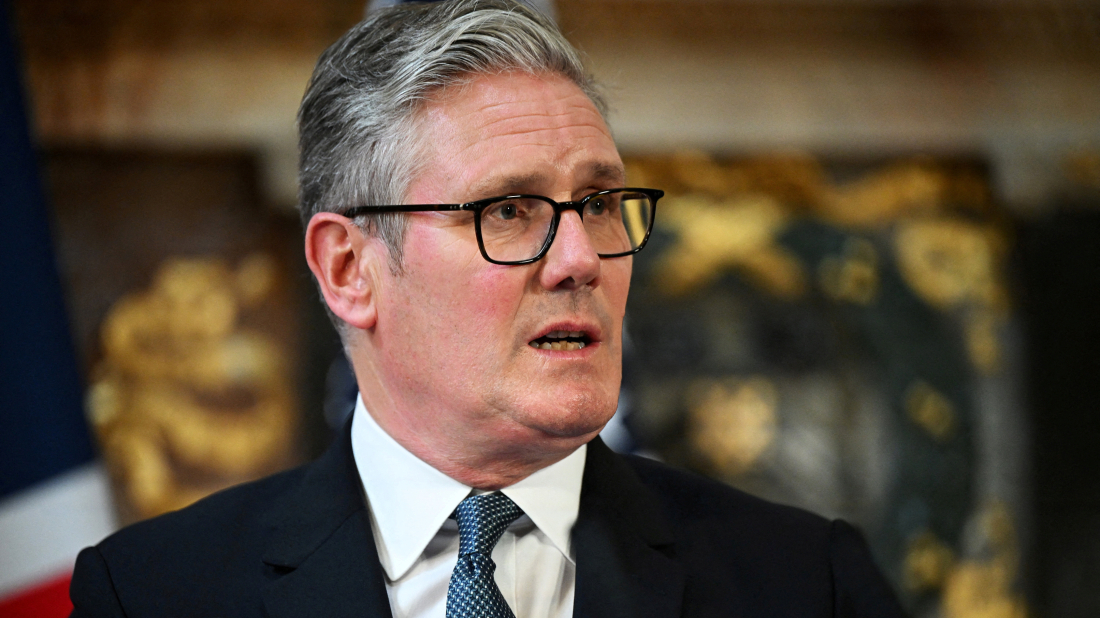U.S. envoy says ‘meaningful progress’ made as Ukraine talks enter second day
U.S. special envoy Steve Witkoff said talks between Russia and Ukraine had brought “meaningful progress” towards ending the war, as negotiations m...

Britain on Friday said it would introduce a mandatory digital ID scheme for British citizens and residents starting a new job as a measure to deter illegal immigration.
"It will make it tougher to work illegally in this country, making our borders more secure," Prime Minister Keir Starmer said in a statement announcing the move.
The government said the digital ID would be held on people's mobile phones and would become a mandatory part of checks that employers already have to make when hiring a worker by the end of the current parliament in 2029.
It would, in time, also be used to provide access to other services such as childcare, welfare and access to tax records.
The announcement comes as polling shows that immigration is top of voters' concerns in Britain, with Starmer under intense pressure to stop migrants entering the country illegally travelling across the dangerous sea from France in small boats.
During the last seven days, 1157 migrants were recorded crossing the English Channel in vessels, according to the government's latest figures.
Last year, there were around 37,000 individuals who were recorded crossing the busy waterway in 2024, marking a 25% increase compared to the previous year, according to the Migration Observatory statistics.
Plan draws criticism
However the plans have drawn criticism from political opponents who say it would not deter migrants and could infringe on civil liberties.
"It's laughable that those already breaking immigration law will suddenly comply, or that digital IDs will have any impact on illegal work, which thrives on cash-in-hand payments," said a spokesperson for Nigel Farage's populist Reform UK Party, which leads opinion polls ahead of an election not due until 2029.
"All it will do is impinge further on the freedoms of law-abiding Brits."
There was also scathing criticism from Irish nationalist politicians in Northern Ireland, where many hold Irish rather than British passports and symbols of British rule are divisive.
The proposal was "ludicrous and ill-thought out" said Northern Ireland First Minister Michelle O'Neill, the head of Sinn Fein in the region.
She said it was "an attack on the Good Friday Agreement and on the rights of Irish citizens in the North of Ireland" referring to the 1998 peace agreement that largely ended decades of violence between Irish nationalists, the British army and pro-British unionists.
Previous ID plans
In the 2000s Starmer's Labour Party, then led by Tony Blair, attempted to introduce an identity card, but the plan was eventually dropped by Blair's successor, Gordon Brown, after opposition that called it an infringement of civil liberties.
Britons have not been issued with identity cards since their abolition after World War Two, and typically use other official documents such as passports and driving licences to prove their identity when required.
Cuba’s fuel crisis has turned into a waste crisis, with rubbish piling up on most street corners in Havana as many collection trucks lack enough petrol to operate.
Iran’s Revolutionary Guards navy held military exercises in the Strait of Hormuz on Monday (16 February), state-linked media reported. The drill took place a day before renewed nuclear negotiations between Tehran and Washington in Geneva.
The 2026 Munich Security Conference (MSC) unfolded over three intense days in Munich, confronting a defining question of our era: has the post-Second World War international order collapsed - and if so, what will replace it?
Canadian Prime Minister, Mark Carney, announced on 16 February that the Honourable Janice Charette has been appointed as the next Chief Trade Negotiator to the United States. She's been tasked with overseeing the upcoming review of the Canada-United States-Mexico Agreement (CUSMA).
Ruben Vardanyan has been sentenced to 20 years in prison by the Baku Military Court after being found guilty of a series of offences including war crimes, terrorism and crimes against humanity.
U.S. special envoy Steve Witkoff said talks between Russia and Ukraine had brought “meaningful progress” towards ending the war, as negotiations moved into a second day in Geneva.
The United States and Iran reported measured progress after a new round of indirect talks in Geneva aimed at resolving the dispute over Tehran’s nuclear programme.
An unidentified man was taken into custody on Tuesday (17 February) after running towards the U.S. Capitol carrying a loaded shotgun and wearing tactical gear, according to Capitol Police Chief Michael Sullivan.
Peru’s Congress has voted to censure and remove José Enrique Jeri Ore from his posts as President of Congress and acting President of the Republic, just four months into his tenure, citing undisclosed meetings with Chinese businessmen and alleged hiring irregularities.
France celebrated Olympic gold in the men’s biathlon relay in Anterselva on Tuesday (17 February), following a thrilling race marked by an electric atmosphere at the stadium.
You can download the AnewZ application from Play Store and the App Store.

What is your opinion on this topic?
Leave the first comment